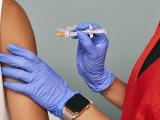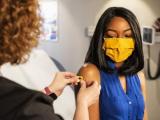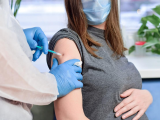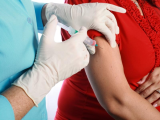Sep 13, 2012 (CIDRAP News) – The US Department of Health and Human Services (HHS) recently awarded a new round of contracts to the five US-licensed influenza vaccine manufacturers to make pre-pandemic and pandemic influenza vaccines—projects that could be worth billions of dollars if another pandemic arises in the next few years.
The 3-year contracts call for making "master vaccine seed stocks" for flu viruses with pandemic potential, conducting clinical trials, and stockpiling vaccines and adjuvants, all with the aim of enabling HHS to respond quickly to flu outbreaks and pandemics, HHS officials said in a Sep 6 press release.
With vaccine seed stocks ready, vaccines can be delivered to the public sooner in a pandemic, the agency said. It didn't list which viruses would be targeted, saying that will be determined later.
The new contracts build on a previous round of contracts with the same manufacturers, which "proved vital in responding to the 2009 H1N1 pandemic," the HHS statement said.
HHS has been working on ways to ensure faster delivery of pandemic flu vaccines since the 2009 H1N1 pandemic, when plentiful supplies of the vaccine didn't arrive until after the episode's peak. Reports released by HHS and the President's Council of Advisors on Science and Technology in 2010 called for developing new flu vaccine technologies and increasing domestic manufacturing of vaccines.
The companies that received contracts are Sanofi Pasteur in Swiftwater, Pa.; Novartis in Cambridge, Mass., and Holly Springs, N.C.; GlaxoSmithKline (GSK) in Philadelphia; CSL Biotherapies of King of Prussia, Pa.; and MedImmune of Gaithersburg, Md. HHS's Biomedical Advanced Research and Development Authority (BARDA) will administer the contracts.
The 3-year contracts are now in effect, said Elleen Kane, a spokeswoman for HHS's Office of the Assistant Secretary for Preparedness and Response. HHS and industry officials said work under the contracts will largely depend on what happens in the realm of circulating flu viruses.
HHS said it would initially commit a total of $4.4 million for production of master vaccine seed stocks and $7.3 million for storage of pre-pandemic vaccines. The agency did not specify the potential maximum amounts of the contracts, but figures were available from two of the companies.
Sanofi Pasteur's contract lists a minimum amount of $600,000 and a maximum of $4.6 billion if all the activities cited in the pack are actually ordered by HHS, company spokesman Len Lavenda told CIDRAP News. The contract is for 3 years plus two optional 1-year extensions.
A CSL Biotherapies press release said its contract would be worth up to $1.51 billion "if all optional activities are exercised over the duration of the contract."
The new contracts allow HHS to buy cell-based vaccines as well as conventional egg-based vaccines in a pandemic, HHS officials said. "Cell-based vaccine production could more easily meet surge capacity needs because cells could be frozen and stored in advance of an epidemic, or developed in response to an epidemic," the agency said.
HHS also said that although existing US seasonal flu vaccines do not contain adjuvants, clinical trials of adjuvanted vaccines are an important part of pandemic preparedness. Adjuvants are used to stretch vaccine supplies by lowering the amount of antigen in each dose.
Lavenda said Sanofi's contract "serves as an umbrella identifying a broad range of activities that could be requested by the government prior to and during an influenza pandemic. The contract does not guarantee any orders to Sanofi Pasteur."
He listed the following as some of the activities covered in the contract:
- Preparing master and working virus seed lots for production of pre-pandemic and pandemic vaccine
- Production of pilot, clinical trial, and commercial-scale vaccine supplies
- Formulation, fill, and finish of vaccine
- International and domestic shipping of vaccine
- Nonclinical and clinical studies of vaccine
- Secured storage services and a stability program for vaccine (bulk and final containers)
CSL Biotherapies said its contract calls for potentially manufacturing and storing bulk antigen that can be used against flu strains with pandemic potential. "The Company may also be called upon to develop working virus 'seeds' for other manufacturers and to formulate, fill, and finish bulk stored antigen," the statement said.
The contract with MedImmune Inc., maker of the intranasal vaccine FluMist, is similar, providing for stockpiling bulk and filled vaccine, clinical trials, storage, shipping, and disposal of monovalent pandemic flu strains, according to company spokesman Tor Constantino.
He declined to put a monetary figure on the contract, commenting, "It would be highly speculative to estimate the value of this contract given the multiple variables that must be considered," such as the pandemic threat, number of doses ordered, and ability to grow the seed strain.
GSK spokesman Robert Perry also declined to name the potential worth of his company's contract, saying it was speculative.
'This is not a new development, nor is this an incredibly significant contract between HHS and the vaccine manufacturers, but at the same time there's a close collaboration that exists between HHS and all the vaccine companies," Perry said.
Sanofi and MedImmune officials said their contracts do not involve any work on cell-based vaccines or adjuvants, and Perry said the GSK contract does not involve cell-based vaccines.
Novartis is currently building and testing a large facility designed to make cell-based flu vaccines and the company's MF59 adjuvant in Holly Springs. Information on what Novartis's contract says about cell-based vaccines was not immediately available, but the plant is being built under a partnership with HHS, with the aim of being able to produce 150 million doses of adjuvanted vaccine within 6 months of a pandemic declaration.
The HHS statement noted that the previous set of contracts was used earlier this year to develop a vaccine against the swine-origin H3N2v flu strain that has infected a number of people exposed to pigs. Close to 300 cases have been reported in the past year, most of them this summer in people who had contact with pigs at county and state fairs.
HHS announced in January that Sanofi and Novartis would make a vaccine aimed at the H3N2v strain for use in clinical trials.
See also:
Sep 6 HHS press release
Sep 10 CSL Biotherapies press release
Jan 6 CIDRAP News story "HHS orders novel H3N2 vaccine for clinical trials"
Dec 2, 2011, CIDRAP News story on H3N2v vaccine



















